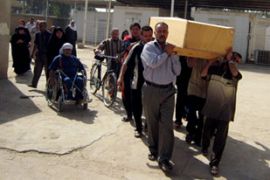Fresh fighting erupts in Iraq
Iraqis say that US troop “surge” is failing, amid continuing fighting.

“There is no improvement in Baghdad on the security level. All of it is getting worse, despite what we hear in the media,” Assad, a government employee, told Owen Fay, Al Jazeera’s correspondent in the Iraqi capital.
US warplanes have carried out several strikes in the area over the past few weeks.
In Baghdad, an Iraqi police officer told the Associated Press that sporadic fighting was continuing in Sadr City.
He said that 18 people were also injured in the neighbourhood, including three women and three children.
The US military on Wednesday announced that two US marines had been killed by a roadside bomb in Anbar province on Monday.
Also on Wednesday, Iraq removed the Iraqi army and police commanders of Basra.
Iraqi army lieutenant general Mohan al-Fraiji and police chief major general Abdul Jalil Khalaf were transferred to senior staff positions in Baghdad and replaced by two other commanders, the Iraqi army spokesman in Baghdad, major general Qassim Atta, said.
Their removal comes just days after Iraq sacked 1,300 army and police personnel for “failing to perform” during the crackdown in Basra.
Hundreds of Iraqi troops and police are reported to have either deserted or swapped sides during the government offensive against Shia militias.
The move came after Iraqi press and blog reports claimed the al Sadr movement had succeeded in infiltrating the Iraqi army and police in Basra.
But Atta denied any link between the confrontations with the Sadris and the officers’ removal.
He said that they were “temporary appointees” and that it was “an administrative move”.
“We are determined to defeat terrorism,” he told the European parliament’s foreign affairs committee.
| In Depth |
|
|
“We are more confident than ever that we are close to a definitive victory over al-Qaeda and its lawless allies.”
Al-Maliki said that al-Qaeda was in a state of “total isolation” in Iraq and seeking “refuge beyond the borders” in neighbouring nations, which he urged to do everything possible to stop them.
a series of bombings in Baquba, Ramadi and Baghdad on Tuesday.
